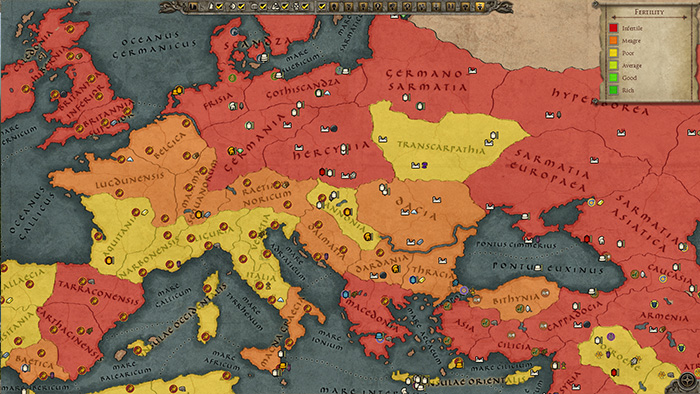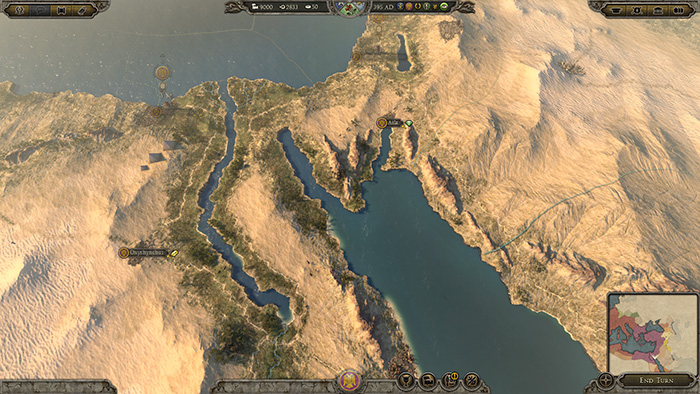The Lay of the Land
Hello Total War aficionados! I’m back with another blog for you all, on some of the more juicy and revelatory issues that will be affecting your campaigns in Total War: Attila. Last time we talked about the ways in which you can affect the world through diplomacy and the subterfuge of your agents.
Today, however, we’ll be focusing in on some of the world mechanics that will be affecting you, and the potential ways you can deal with it. Not long ago, we released our Barbarian Hordes Feature Spotlight, in which Craig’s sultry tones deal with the roaming migratory factions of Attila and briefly touches upon the subject of fertility and food. So with that in mind, we shall forge onwards!
Food:
For those of you who are unaware, food is a variety of edible substance that we as humans consume for sustenance and continued life. In Total War it’s vital that you continue to keep your people stocked with that delicious consumable goodness so that they don’t starve, or revolt, or both.
Food has long been the responsibility of the farmer in Total War (and, also, in real life, although I think they stole the idea from us) with the land being toiled for crops and animals to sustain empires. In Attila, this is no different at the core of it, and yet there is one new mechanic that will hugely affect the way in which you approach your food generation and maintenance.
Fertility:
Yes, fertility! Take a seat and let me tell you all about it!
Okay. I have been informed this is not the fertility I was thinking about, and so now I have to tell you about fertility in Attila instead.
To coin an overused phrase, winter is on its way (I think that was it), and in Attila this takes the form of climate change. Volcanic activity, and maybe even interference from space (no, really!), during the first millennium AD caused a dramatic shift in the weather across the world, or at the very least the ancient world. Temperatures plummeted, particularly in the north and east of Europe, where the shift was so bad crops failed and people died as their homes became completely inhospitable. The climate change is one of several reasons why the migrating barbarian hordes packed up their settled lifestyle and began pushing south and east, onto the Roman Empire.
This shift in the land’s fertility is borne out in Total War: Attila, as gradually the arable nature of the soil in your settlements will begin to falter and fail as the darker times encroach. You can remain in these lands, if you wish, but the reduced fertility of the soil will drastically affect your crops, your food output and ultimately your faction’s overall strength. With other powers reaping the harvest of their still-fertile lands, you would soon find yourself outstripped and outmatched in both military and economic terms.
An army, as they say, marches on its stomach, and no arable land means no food, which means no fed army. On top of this, armies that languish in less fertile lands will replenish at a much slower rate. Although in the short term you can merge units together, and attempt to recruit more, this will nevertheless strain army management, and may not be entirely sustainable. As they starve, the integrity of your forces may then suffer and deplete, leading to unhappiness, reduced combat effectiveness and, who knows, even revolution.
There are two types of food producing buildings in Total War: Attila; those that harness the fertility of the land they are built upon, and those that do not:
• Those that do not will provide you with a stock output of food each turn (i.e. 2. Flat 2. No more and no less), but you can be assured of that amount of food from that building. The fertility of the land has nothing to do with it.
• Those that do harness the fertility of the land will have modifiers applied to the base amount of food they give you. So a fertility-based building that gives a base amount of 2 (again, 2) and then will multiply by the fertility of the land. So you might get three, or four, or even five food! Look at that. Dough everywhere. Rolling in bread. Mounds of the stuff.
Winter, as well as being much harsher as time goes by, will also last longer as the campaign progresses. Further north, where the climate change is most severe, you might see as many as three out of four turns be winter, with all the attrition and fertility penalties that come with it. Also, as the soil fertility falters, the people will grow malnourished and where weakness lies, disease will surely follow.
Historically, climate change was not limited to the deepening and lengthening of the cold in the north, but in the summers the world was ravaged by droughts and shortages of essential rains, causing despair even when the winter chill wasn’t biting at civilization. Across Europe, an increase of deforestation exacerbated the declining climate as the landed people of Greece and Italy overreached and found themselves rueing the day.
These things bear themselves out in Total War: Attila through event messages, dilemmas and incidents, but we have taken some license with fertility to help tell the narrative of the darkening and chilling of the world, and creating the sense that many felt at the time – that this was the end of days.
In Total War: Attila, we were very keen to demonstrate that the climate change that was transforming the world was no trivial matter. Everyone in late antiquity was suffering the effects of this dramatic global change, and you the player will also have to tackle the crisis in your campaigns. The very ground beneath your feet could well be your undoing, if you do not treat the situation with the reverence it deserves.
As a migratory tribe, your chief method of dealing with this is by, as the name suggests, migrating. As you see the fertility of the land begin to fail (you can check on the strategic overview map with the fertility filter) pack up your possessions, wave farewell to the life of a settled nation, and begin moving away from the freezing northlands. Although the settled nations of the south may not like you encroaching onto their territory in search of more hospitable lands, pleasing them is neither your concern nor your intention. Migrating tribes cannot negotiate access with any faction, but instead must simply take their chances and move across, undeterred.
It is worth noting, however, that if you choose to remain in one place and rely on the per-turn, flat stock food production buildings, it is not catastrophic. You can survive and make a life for your people, but the player who is thinking several steps ahead of the game knows that it might not be sustainable forever, especially when the more fertile lands will be making your enemies and would-be enemies more powerful than you. Migration is a risky move, but can pay dividends if you achieve your aims.
Starting Out:
The two Roman Empires, at the outset of the game, are sitting on some of the more fertile areas in the game, and the land fertility begins to drop after you leave Roman borders – territory held by the barbarian tribes. The Western Roman Empire, in particular, stands on a shaky firmament; with too few armies to defend all areas of the imperium, some concessions may be necessary to survive, and so some of the more fertile lands must be sacrificed, lest the western empire risks being completely overrun.
By contrast, the Eastern Roman and Sassanid Empires share between them the ‘fertile crescent’ in the Nile Valley and Mesopotamia, respectively. This band of hyper-fertile land is the backbone of the wealth of these two nations and, especially for the Sassanids, safeguards them against any immediate encroachment from the hungry and the desperate.
Yet the tribes push upon Constantinople from the north, and the Sassanids know well that nomadic tribes may move towards them from above, through Asiatica. The displaced people of the cold north have become hungry, and thus desperate, and that makes them dangerous.
So, that’s fertility. Not the other fertility, but the Total War fertility. It will be both a help and a hindrance in your campaigns, and will help provide you with the impetus to conquer new territories, explore exotic new vistas and take complete and total war to lands your troops may never have heard of!
Until next time, may your wars be glorious and your harvests plentiful.
- Pete



